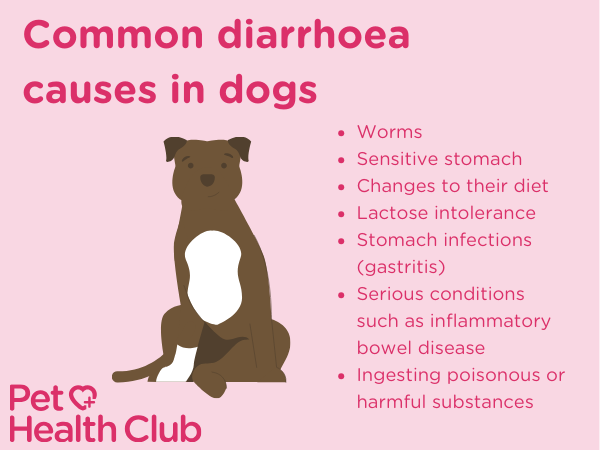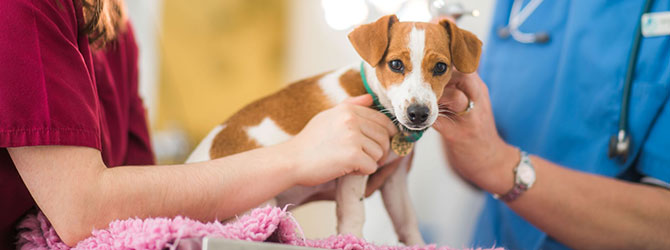Why does my dog have diarrhoea? Causes of diarrhoea in dogs
We all know how rubbish we feel after a bout of diarrhoea and vomiting – and no one wants to think of their dog suffering in the same way. Dog poo, poop or faeces – there are lots of names for it, but if your dog is experiencing an episode of runny or continuous diarrhoea, you may need to take action.
While a one-off bout of diarrhoea may simply be a sign that your dog has eaten something that has unsettled their stomach, there are many possible causes of diarrhoea in dogs.
Dog diarrhoea is a good reason to visit your local vet, who will help to establish the cause and recommend treatment, if necessary. Prolonged bouts of diarrhoea can quickly cause your dog to become dehydrated, so it's important to be vigilant.
@thepethealthclub What does your dog poo mean? Kath the vet breaks down the different types of dog poo and what each stool could mean. So where is your dog scoring on the poop chart? #dogsoftiktok #doghealthcare #doghealthtips #vetadvice #dogownerproblems #dogs#dogadvice #pethealthclub ♬ original sound - Pet Health Club
Diarrhoea in dogs: the warning signs
If your dog has a one-off bout of diarrhoea but is otherwi4se alert, active, eating normally and showing no other symptoms, there's no cause for alarm unless there is blood in it.
If they're lethargic, have diarrhoea for over 24 hours, are vomiting, lose their appetite, or display any other symptoms, don't delay. Get them to your local vet.
Always book an appointment immediately if the diarrhoea contains blood or if you suspect your dog has come into contact with a toxic or harmful substance.
Common causes of dog diarrhoea

Worms
Worms are a pesky problem for dogs of all ages but are particularly common in puppies. They can get them from eating infected soil, licking contaminated fur or paws, or even from fleas. The main culprits are roundworms, tapeworms, hookworms, and whipworms.
These unwelcome guests can interfere with your dog's intestinal lining, causing diarrhoea, often with a sudden onset. You might notice your dog seems hungrier than usual but is losing weight. Worms can sometimes be seen in your dog's poop or around their bum - they can look like small bits of rice or spaghetti. Regular worming treatments are your best defence here.
Sensitive stomach
Some dogs have sensitive stomachs; it's just how they're built. They can react to certain ingredients in their food, leading to an upset stomach and diarrhoea.
Signs include intermittent loose stools, vomiting, and gas. Food allergies can also present with other symptoms, such as itchy skin and ear disease.
If your dog has a sensitive stomach or food allergies, you must pay close attention to their diet. High-quality, easily digestible food with minimal additives can help manage this condition. Sometimes, it's a bit of trial and error to find the food that agrees with them.
Changes to their diet
Dogs' digestive systems can be sensitive to change. Switching their food too quickly or introducing new treats can upset their stomach and is a common cause of diarrhoea in dogs. The key is to transition any new food slowly, mixing it with their current food over 10-14 days, gradually increasing the new food's proportion and decreasing the old. This gives their digestive system time to adjust.
Lactose intolerance
Just like some humans, adult dogs can be lactose intolerant. This means their body struggles to break down lactose, a sugar found in milk and dairy products, leading to diarrhoea. If your dog gets an upset stomach after a training session where cheese is the reward, lactose intolerance could be the culprit. The simple solution is to avoid giving them dairy products.
Stomach infections (gastritis)
Gastritis is inflammation of the stomach lining, often caused by infections from bacteria, viruses, or even eating spoiled food. It's as unpleasant for them as it sounds. Symptoms include vomiting, diarrhoea, dehydration, and lethargy. Dogs explore the world with their mouths so they can easily pick up something contaminated. If you suspect gastritis, a trip to the vet is in order. They might need medication to clear up the infection and get their stomach back to normal.
Colitis
Colitis is inflammation of the colon. It can cause frequent, small amounts of diarrhoea, often with mucus or blood. Stress, infections, or dietary intolerances can trigger it. Dogs with colitis might need to go out more urgently and frequently. Managing colitis often involves dietary changes and, in some cases, medication to reduce the inflammation. It's a condition that can flare up throughout their life, so understanding what triggers it for your dog is key.
Parvovirus
Parvovirus is a highly contagious viral disease in dogs. Canine parvovirus is especially dangerous to unvaccinated or incompletely vaccinated puppies between six weeks and six months old. However, older dogs can get it, too, especially if they've got other health issues.
In the gut, the virus damages the intestinal walls, breaking down the protective internal layers of the intestines. This causes vomiting, diarrhoea and dehydration, as it becomes more difficult for your dog to absorb nutrients and water. The internal damage risks letting bacteria in, which could lead to further infection, sepsis and shock.
Inflammatory bowel disease (IBD)
IBD is the name for a group of disorders caused by an abnormal immune response, leading to intestinal wall inflammation. It's serious and can cause chronic diarrhoea, weight loss, and poor appetite. The exact cause isn't known, but it's thought to involve genetics, diet, and an abnormal immune response. Treatment often involves dietary management and medications to control the immune response. It's a long-term condition that needs careful management.
Ingesting poisonous or harmful substances
Dogs are curious, and sometimes that curiosity leads them to eat things they shouldn't. Many common household items and plants can be toxic to dogs, causing anything from mild gastrointestinal upset to severe poisoning.
Depending on the substance, symptoms can include diarrhoea, vomiting, lethargy, incoordination and more serious signs such as seizures.
Contact your vet immediately if you think your dog has eaten something harmful. Prevention is key here, so keep an eye on your dog and keep harmful substances out of your paw's reach.
Remember, if your dog is experiencing diarrhoea, it's important to monitor their hydration levels. Diarrhoea can lead to dehydration quickly, especially in young pups and older dogs. Offer plenty of fluids and small amounts of bland food.
How to prevent diarrhoea in dogs
Keeping your dog from getting diarrhoea can be done, but it's tricky. Here's how to minimise the risk and keep your dog's digestive system running smoothly.
Keep up with regular worming
Worms are a common cause of diarrhoea, so regular worming is key. Your vet can recommend a worming schedule, which usually involves treatment every few months. It's a simple step that can save a lot of trouble.
Choose the right food
If your dog has a sensitive stomach, finding a food that suits them is crucial. Look for high-quality, easily digestible foods with few artificial additives. Hypoallergenic diets can help dogs with known allergies or sensitivities. When you change their food, remember to do it gradually over a week to avoid upsetting their stomach.
Be cautious with human food
Dogs can be lactose intolerant and sensitive to other foods that don't bother us. Avoid giving your dog dairy products, and be cautious with scraps from the table. Some human foods, like chocolate, grapes, and onions, can be toxic to dogs. Stick to dog-specific treats or safe fruits and vegetables in moderation.
Keep an eye on what they're eating
Dogs are curious and sometimes eat things they shouldn't. Watch them during walks and in the garden to prevent them from ingesting harmful substances or spoiled food. Keeping rubbish bins secure and household chemicals out of reach is also a good idea.
Manage stress
Just like in humans, stress can upset a dog's digestive system. Try to keep your dog's environment as stress-free as possible. Regular exercise, playtime, and sticking to a routine can help manage their stress levels.
Regular vet check-ups
Regular check-ups with your vet can help catch and manage conditions that might cause diarrhoea, like colitis or inflammatory bowel disease. Your vet can also offer advice tailored to your dog's health needs.
Probiotics
Probiotics can help maintain a healthy balance of bacteria in your dog's gut, which can be beneficial, especially after a course of antibiotics or during a diet change. Dog-specific probiotic supplements are available but check with your vet before starting any new supplement.
Clean water
Make sure your dog always has access to clean, fresh water. Staying hydrated is important, especially if they get diarrhoea, as it can lead to dehydration quickly.
Be prepared
Even with all these precautions, dogs can still occasionally get diarrhoea. Keeping a close eye on them and acting quickly if they get sick can help prevent more serious issues. Having a plan for when you might need to visit the vet and know what signs to look out for means it's time to get professional help.
Preventing diarrhoea in dogs is about careful management and sometimes a bit of detective work. By following these tips, you do your best to keep your dog's digestive system happy and healthy.
Treating diarrhoea in dogs at home
If your dog has a minor bout of diarrhoea, you may be able to manage it at home. Offer plenty of water and small, frequent meals. It is no longer recommended to starve a dog with diarrhoea. Small portions (around a handful) of bland food such as plain chicken, white fish, or scrambled eggs can help tempt your dog to eat and relieve the diarrhoea.
Contact your local vet if your dog doesn't improve in 24-48 hours or shows other signs such as vomiting, lethargy, or not eating.
How will a vet treat diarrhoea?
Your vet will ask many questions about your dog's health and recent activities. They'll want to know about the duration, frequency, and appearance of the diarrhoea (photos will help). They'll also ask about any changes in diet or environment, recent travel, access to garbage or toxins, and if your dog has been wormed recently. This info can give clues about the cause.
Physical examination
Next, your vet will give your dog a thorough physical exam. This includes checking their weight, temperature, and hydration status and feeling their abdomen to identify any pain, swelling, or unusual masses. They'll also look at your dog's gums, eyes, and skin to check for signs of dehydration or other related issues.
Faecal examination
Your vet might ask for a poop sample that might be needed to check for worms, protozoa, or bacteria that could be causing the diarrhoea. This test can identify common parasites like roundworms, hookworms, and giardia. Sometimes, your vet might send the sample to a lab for more detailed analysis.
Blood tests
Blood work can provide valuable information about your dog's overall health and help rule out or confirm certain conditions. A complete blood count (CBC) and a biochemistry profile can assess organ function and electrolyte status and look for signs of infection or inflammation.
Urinalysis
While it might not seem directly related, a urine test can provide insights into a dog's hydration status and kidney function, which can be affected by ongoing diarrhoea.
Specialised tests
Depending on the initial findings, your vet might suggest more specialised tests. These could include testing for specific viruses (like parvovirus), bacterial cultures, endoscopy (using a camera to look inside the digestive tract), or intestinal biopsies.
Treatment plan
Once your vet has gathered all this information, they can create a treatment plan. The plan will depend on the diagnosis, including dietary changes, medication, probiotics, or specific treatments for underlying conditions like inflammatory bowel disease or infections.
Monitoring and follow-up
After starting treatment, your vet will likely want to closely monitor your dog's progress. They might recommend a follow-up visit to check how your dog responds to treatment and make any necessary adjustments.
Diagnosing diarrhoea in dogs is a process of elimination, aiming to narrow down the vast list of possible causes to identify the specific issue affecting your dog. It can seem daunting, especially with all the tests involved, but remember, each step brings your vet closer to helping your dog feel better. If your dog's having a tough time with diarrhoea, getting them to the vet is the best first step. They have the know-how and tools to determine what's happening and how to fix it.
Need help and advice for a dog with diarrhoea?
If your dog has diarrhoea for over 24 hours, make an appointment to see your local vet immediately.
Find your nearest vet using our Find a Vet page, or speak to a vet online using Online Vets.



